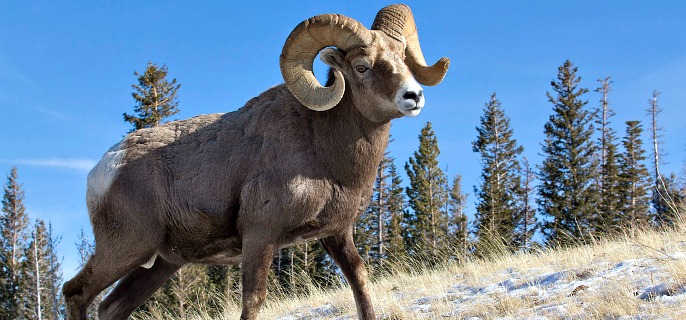
PHOTO COURTESY OF ODFW
Bighorn sheep capture and transplant operations this week in Eastern Oregon are continuing decades-long efforts to restore this rare native animal to its historic range.
Since the first California bighorn sheep were brought from Williams Lake, BC, Canada in the 1954, the population has grown to 3,500-3,700 among herds in southeast Oregon. Northeast Oregon’s Rocky Mountain sheep have grown to about 800 since the first successful transplant of 40 animals from Jasper National Park, Canada in 1971.
ODFW’s yearly capture and transplant operations help thin too-large herds, supplement herds that need more numbers and increase genetic diversity. This year, efforts focused on reducing the size of the I-84 herd. A total of 26 animals from the herd were relocated to the Diablo Mountain and Coglan Buttes herds in Lake County.
ODFW also captured seven Rocky Mountain sheep in the Lookout Mountain Unit and transported them to Washington State as part of the Hells Canyon Initiative, a joint effort by state and federal agencies and sportsman groups to restore bighorn sheep in the area.
During the capture operations this week, a helicopter was used to locate sheep before they were captured using a net fired out of the helicopter from a specially-designed gun. Once captured, the sheep were blindfolded and restrained to calm them, then hoisted in the air by the helicopter and taken to a location where ODFW biologists and veterinarians processed the animals. Each bighorn sheep was disease-tested and many were fitted with a GPS transmitter so their movements can be tracked. Volunteers from the Oregon Foundation for North American Wild Sheep (Oregon FNAWS) also assisted in the operation.
Disease concerns for wild sheep: 2016 Owyhee hunts cancelled
After completing the I-84 sheep capture operation, ODFW moved to southeast Oregon to disease test and collar nearly 60 sheep in Whitehorse Unit. ODFW will be stepping up surveys and disease sampling in herds in Oregon’s southeast corner (Whitehorse and Owyhee Units) due to disease concerns.
A strain of pneumonia from a previous outbreak in Nevada’s wild sheep is now affecting wild sheep in the Whitehorse Unit. Testing of sheep in the Rattlesnake and 10-mile area of the Whitehorse Unit has confirmed the strain is one that led to a loss of sheep in Nevada’s Santa Rosa Mountains in 2003-04. “These bacteria can persist in sheep populations over long periods of time, even decades, and move long distances and across state boundaries,” said Dr. Colin Gillin, ODFW wildlife veterinarian.
The Owyhee Unit is experiencing a more current disease outbreak after a new strain of Mycoplasma ovipneumonia (M.ovi), the respiratory pathogen that can cause pneumonia, was detected in this herd in late 2015. ODFW’s mid-December 2015 helicopter surveys detected 50-60 percent fewer sheep in the Owyhee unit than in March 2015. Samples testing positive for the pathogen have come from hunter-harvested sheep on both sides of the Owyhee Canyon (from Leslie Gulch to Hole in the Ground, a distance of 37 river miles). Further monitoring will help determine the extent of the outbreak and whether the disease has run its course or if more sheep are getting sick or dying.
“Our biggest concerns at this point is the level of infection, how prevalent the bacteria is in our herds, and whether we can devise a management strategy to mitigate the effects of a pneumonia outbreak,” said Gillin.
Due to the outbreak and concern that hunting opportunity could be poor, ODFW is cancelling bighorn sheep hunting in the Owyhee Unit for 2016. In recent years, the unit has been offering 10 bighorn sheep tags spread across three hunts.
Any hunter who has already applied for this hunt as a first choice may cancel the application for a refund, make their second choice sheep hunt their first choice, or change their application. See page 14 of the Oregon Big Game Regulations for details or call ODFW Licensing at (503) 947-6101.
Disease was one of the factors behind bighorn sheep’s extirpation in the 1940s, along with unregulated hunting. But sport hunters have since been instrumental in restoring bighorn sheep in Oregon. ODFW’s annual auction and raffle of special bighorn sheep tags have generated thousands of dollars for their management and for research here in Oregon. Groups like Oregon FNAWS have also contributed money and time.
Bighorn sheep are one of the rarest game mammals in Oregon today. Less than 100 bighorn sheep tags were offered to hunters last year on a “once-in-a-lifetime” hunt basis. ODFW also auctions and raffles off a bighorn sheep tag each year at events sponsored by sportsmen conservation groups; proceeds from the sales benefit the management of bighorn sheep.










